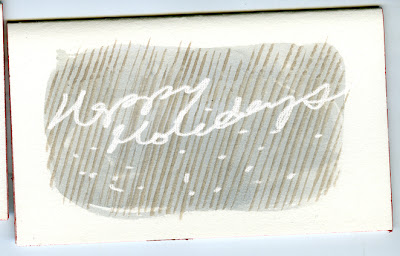
December 18, 2007
December 15, 2007
December 08, 2007
December 04, 2007
December 02, 2007
November 28, 2007
November 16, 2007
November 15, 2007
TIFF 07 : 5
 The Iron Ladies of Liberia is an incredible documentary about modern women fighting against adversity beyond anything we can imagine. Liberia, wracked by 14 years of civil war, 4 bilion dollars in debt, short of almost all electricity and running water, and governed by a police force without guns or handcuffs, is about to go through a democratic election. In January 2006, Ellen Johnson Sirleaf became the first ever freely elected female head of state in Africa, and despite rebel armies, a fiercely oppositional speaker of the house, and a populace sometime slow to take to change, she and her cabinet begin to turn the country around. Through honesty, hard nosed strength and the patience and capacity to listen that earned her the nickname "Old Ma", we watch her deftly manage the local market women, the workers at the firestone rubber plant, rallying army strikers and even George Bush himself. Amazing. Iron Ladies of Liberia
The Iron Ladies of Liberia is an incredible documentary about modern women fighting against adversity beyond anything we can imagine. Liberia, wracked by 14 years of civil war, 4 bilion dollars in debt, short of almost all electricity and running water, and governed by a police force without guns or handcuffs, is about to go through a democratic election. In January 2006, Ellen Johnson Sirleaf became the first ever freely elected female head of state in Africa, and despite rebel armies, a fiercely oppositional speaker of the house, and a populace sometime slow to take to change, she and her cabinet begin to turn the country around. Through honesty, hard nosed strength and the patience and capacity to listen that earned her the nickname "Old Ma", we watch her deftly manage the local market women, the workers at the firestone rubber plant, rallying army strikers and even George Bush himself. Amazing. Iron Ladies of Liberia Director Takeshi Kitano takes us through a series of fictional false starts as he searches for a film that both satisfies and makes money. More loosely structured than it should be, and slooow in the pacing, the film still manages a few funny homages and parodies of the types of stories we tell on film. He makes fun of Ozu, which was fun for me. Laboured and opaque in its second half, the film needed to be a lot tighter. Glory to the Filmmaker!
Director Takeshi Kitano takes us through a series of fictional false starts as he searches for a film that both satisfies and makes money. More loosely structured than it should be, and slooow in the pacing, the film still manages a few funny homages and parodies of the types of stories we tell on film. He makes fun of Ozu, which was fun for me. Laboured and opaque in its second half, the film needed to be a lot tighter. Glory to the Filmmaker! A delicate, subtle and believable portrayal of girls negotiating womanhood. Reminiscent of Show Me Love, Fat Girl, Ghost World and My Summer of Love, in that it describes one of these odd, unspoken relationships--the friend crush, a mix of admiration, comfort, and affection. Naissance des Pieuvres
A delicate, subtle and believable portrayal of girls negotiating womanhood. Reminiscent of Show Me Love, Fat Girl, Ghost World and My Summer of Love, in that it describes one of these odd, unspoken relationships--the friend crush, a mix of admiration, comfort, and affection. Naissance des Pieuvres Dalton Trumbo, writer of such films as The Brave One, Exodus and Spartacus, was also a member of the Hollywood Ten--film professionals blacklisted by the HUAC in 1947. Trumbo is an articulate film about an articulate screenwriter who, through his actions, protestations and correspondences regarding the Hollywood Ten Blacklist, showed himself to be a true humanist, activist and American. As his powerful and funny letters are read by some of America's great actors, they clearly describe his strength of character; a letter to his daughter's elementary school principal is staggering in its sensibility and critique. One wishes the production values were higher, and that the readings were sometimes simply that, and not pseudo performances, but regardless, you walk away with mountains of profound respect for this strong, and deeply passionate man. Trumbo
Dalton Trumbo, writer of such films as The Brave One, Exodus and Spartacus, was also a member of the Hollywood Ten--film professionals blacklisted by the HUAC in 1947. Trumbo is an articulate film about an articulate screenwriter who, through his actions, protestations and correspondences regarding the Hollywood Ten Blacklist, showed himself to be a true humanist, activist and American. As his powerful and funny letters are read by some of America's great actors, they clearly describe his strength of character; a letter to his daughter's elementary school principal is staggering in its sensibility and critique. One wishes the production values were higher, and that the readings were sometimes simply that, and not pseudo performances, but regardless, you walk away with mountains of profound respect for this strong, and deeply passionate man. Trumbo
Alright folks; it took a while, but there are the reviews. Thanks for reading!
October 15, 2007
TIFF 07 : 4
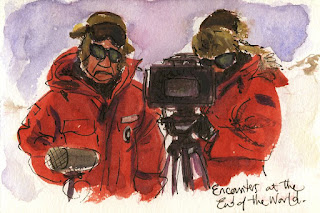 In Antarctica, Herzog searches for what drives people to this place so far outside of society. Escape, peace, adventure, ego, madness, the secrets of the universe and the humble celebration of humanity are what he finds--a frozen sturgeon, a popcorn necklace and paper flowers. The universe begins to see itself as we begin to see it...right? It's a little loosely structured for my taste, but maybe I'd need to watch it again. Very entertaining, and definitely eye opening, Herzog deftly captures the quirky inhabitants of this strange little community of searchers. Encounters at the End of the World
In Antarctica, Herzog searches for what drives people to this place so far outside of society. Escape, peace, adventure, ego, madness, the secrets of the universe and the humble celebration of humanity are what he finds--a frozen sturgeon, a popcorn necklace and paper flowers. The universe begins to see itself as we begin to see it...right? It's a little loosely structured for my taste, but maybe I'd need to watch it again. Very entertaining, and definitely eye opening, Herzog deftly captures the quirky inhabitants of this strange little community of searchers. Encounters at the End of the World Useless is a film that I thought was going to be about the contrast between Chinese Haute Couture and industrialized labour; maybe a meditation on what fashion is, what it really means, how it functions in society, and its worth. It wasn't really. Or maybe it was, but was too long and too cold and too objective to hold my interest, and to make me want to form connections. It was very boring--even for me. Useless
Useless is a film that I thought was going to be about the contrast between Chinese Haute Couture and industrialized labour; maybe a meditation on what fashion is, what it really means, how it functions in society, and its worth. It wasn't really. Or maybe it was, but was too long and too cold and too objective to hold my interest, and to make me want to form connections. It was very boring--even for me. Useless
An historic sequel. Attractive, but very fragmented and a little overwrought. Spain is way overly caricatured--I mean, really really villified. Sillified. Mary the Queen of Scots, and Elizabeth herself were awesome though; In the end, I think the script was maybe just kind of funny. Elizabeth's big turning point revelation is just silly, and her rallying speech is kind of flat. The idea here was to play Warrior Queen against some interior, hidden Winsome Woman. The whole thing is just too muddled in plot, and too melodramatic. Attractive though. Elizabeth: The Golden Age
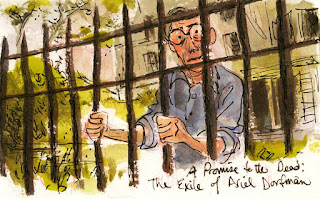 From the filmmaker of Shake Hands with the Devil comes an engrossing documentary about Ariel Dorfman, Allende party member, and witness to the atrocities of Pinochet's dictatorship. When all members of the party were executed, Dorfman was kept alive so he could tell the world their story; this is it. Party history lesson, and part rumination on home, death, the meaning of exile, and our need to accept and reconcile differences. Really incredible documentary footage of rallies in Chile. It could have been more tightly and pointedly structured, but a terrifying and important film nonetheless. A Promise to the Dead: the exile of Ariel Dorfman
From the filmmaker of Shake Hands with the Devil comes an engrossing documentary about Ariel Dorfman, Allende party member, and witness to the atrocities of Pinochet's dictatorship. When all members of the party were executed, Dorfman was kept alive so he could tell the world their story; this is it. Party history lesson, and part rumination on home, death, the meaning of exile, and our need to accept and reconcile differences. Really incredible documentary footage of rallies in Chile. It could have been more tightly and pointedly structured, but a terrifying and important film nonetheless. A Promise to the Dead: the exile of Ariel Dorfman
October 12, 2007
TIFF 07 : 3
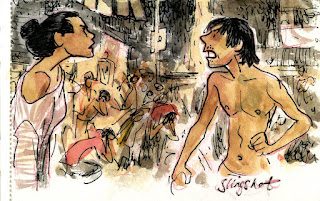 Slingshot is a frenetic, verité style journey into the world of poverty stricken Manila. Violent, morally ambiguous, and at times terrifying, this film seems to honestly portray this society on the brink of destruction. Sudden flares of violence, theivery and infidelity describe social conditions that seem insurmountable. Unfortunately, the film is too sprawling, never ending--I wish it were more focussed; it's restless energy is both its strength and undoing. Incredible and upsetting and long. Slingshot
Slingshot is a frenetic, verité style journey into the world of poverty stricken Manila. Violent, morally ambiguous, and at times terrifying, this film seems to honestly portray this society on the brink of destruction. Sudden flares of violence, theivery and infidelity describe social conditions that seem insurmountable. Unfortunately, the film is too sprawling, never ending--I wish it were more focussed; it's restless energy is both its strength and undoing. Incredible and upsetting and long. Slingshot Perhaps the very worst film of the festival. Poorly structured, pretentious, annoying, boring, inarticulate, insubstantial; wholly unsatisfying. Boldly drawn out ie, loooooong scenes are poorly concieved and executed; aimless. The poetry of the banal the director attempts to celebrate is instead a parade of overdressed extras: the girl on the bike, the woman with a trombone case, the man with flowers and a limp. Hideous, immature, uninsightful compositions, scenes and sequences play flat and shallowly, as clever as the director attempts to be. The subversion of narrative structure--setup and payoff--severly injures this film from minute one; the director fails to let us identify with the characters and so we never ever do. Awful. Dans la ville de Sylvia
Perhaps the very worst film of the festival. Poorly structured, pretentious, annoying, boring, inarticulate, insubstantial; wholly unsatisfying. Boldly drawn out ie, loooooong scenes are poorly concieved and executed; aimless. The poetry of the banal the director attempts to celebrate is instead a parade of overdressed extras: the girl on the bike, the woman with a trombone case, the man with flowers and a limp. Hideous, immature, uninsightful compositions, scenes and sequences play flat and shallowly, as clever as the director attempts to be. The subversion of narrative structure--setup and payoff--severly injures this film from minute one; the director fails to let us identify with the characters and so we never ever do. Awful. Dans la ville de Sylvia
Terror's Advocate is a biography of French lawyer and staunch anti-colonialist Jacques Vergès. Defender of Algerian revolutionaries, Palestinian terrorists, a Nazi torturer and countless dictators, Vergès is depicted as a complex, mysterious (his inexplicable disappearance for eight years) and morally righteous man, and through the film you really come to understand his intentions and point of view; it's an incredible story. The film suffers from a lack of direction however, and is too loosely organized for its own good. Truly fascinating though. Terror's Advocate
 A very personal documentary about director Guy Madden's hometown. Mixing important and frivilous, public and private, real and fantastic accounts of historical events, Guy dissects not only his own longings and aversions to his hometown, but also hints at why any of us feels attachment--and disappointment--in the places we inhabit. Chronicling such strange events as the pack of horses frozen in the river (an attractive destination for young couples), the flattening of Happyland by a bison stampede, the rash of ectoplasmic sceances in the 20's, the dissolution of the Winnipeg Jets hockey team and arena and the commonality of orange jello, Guy also rents his childhood home for a month and hires actors to play his family. Strange, very funny, sad, very funny, sad and nostalgic. Highly recommended (although probably especially if you're from Winnipeg). My Winnipeg
A very personal documentary about director Guy Madden's hometown. Mixing important and frivilous, public and private, real and fantastic accounts of historical events, Guy dissects not only his own longings and aversions to his hometown, but also hints at why any of us feels attachment--and disappointment--in the places we inhabit. Chronicling such strange events as the pack of horses frozen in the river (an attractive destination for young couples), the flattening of Happyland by a bison stampede, the rash of ectoplasmic sceances in the 20's, the dissolution of the Winnipeg Jets hockey team and arena and the commonality of orange jello, Guy also rents his childhood home for a month and hires actors to play his family. Strange, very funny, sad, very funny, sad and nostalgic. Highly recommended (although probably especially if you're from Winnipeg). My Winnipeg
October 10, 2007
TIFF 07 : 2
 In honour of the 60th anniversary of the Cannes Film Festival, a collection of 35 three minute films about the cinema was commissioned by the festival director Gilles Jacob. A mixed bag, but fun and refreshing overall--expecially after a spate of loooong movies. There are really awesome films by Lars Von Trier, Ken Loach, the Dardennes brothers, Walter Salles and a few others; there are a couple of really terrible ones too. Surprisingly, there are a number of recurring elements: crying women, excited children, blind people remembering... A great little tribute to the cinema. Chacun Son Cinema
In honour of the 60th anniversary of the Cannes Film Festival, a collection of 35 three minute films about the cinema was commissioned by the festival director Gilles Jacob. A mixed bag, but fun and refreshing overall--expecially after a spate of loooong movies. There are really awesome films by Lars Von Trier, Ken Loach, the Dardennes brothers, Walter Salles and a few others; there are a couple of really terrible ones too. Surprisingly, there are a number of recurring elements: crying women, excited children, blind people remembering... A great little tribute to the cinema. Chacun Son Cinema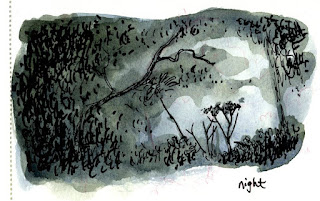 Night is essentially an essay about night and our relationship to it. It's the kind of film I really want to like, I guess because I'm curious to see how they structure it; how they decide to tell a story about something essentially neutral. It's reminiscent of Baraka and Koyaanisqatsi, or an Eames film or a learning channel documentary, rife with star fields, traffic flows, and night storms in time lapse (which are amazing, by the way). The film is loosely organized into segments on fear, home, nightlife, those who work at night, etc. and offers some surprisingly, beautiful and smart insights into the nature of nighttime: that it becomes a showcase for light; that it not only sounds different from the day, but richer; that the dusk is the day negotiating with the night to create evening. I do wish it were more directed, more narrowing, and more articulate, but overall it was pretty enjoyable. Night
Night is essentially an essay about night and our relationship to it. It's the kind of film I really want to like, I guess because I'm curious to see how they structure it; how they decide to tell a story about something essentially neutral. It's reminiscent of Baraka and Koyaanisqatsi, or an Eames film or a learning channel documentary, rife with star fields, traffic flows, and night storms in time lapse (which are amazing, by the way). The film is loosely organized into segments on fear, home, nightlife, those who work at night, etc. and offers some surprisingly, beautiful and smart insights into the nature of nighttime: that it becomes a showcase for light; that it not only sounds different from the day, but richer; that the dusk is the day negotiating with the night to create evening. I do wish it were more directed, more narrowing, and more articulate, but overall it was pretty enjoyable. Night Go ahead and make fun of me, but Glass: a portrait of Philip in twelve parts was a pretty good documentary. Smart and broad, it shows Philip on the Cyclone roller coaster with this family, conversing with Chuck Close in his studio, in footage of his involvement with the emerging SoHo scene of the 60's and 70's, and making pizza while collaborating on a new opera from his second home in Nova Scotia (Canada). It depicts him as a real human being; brilliant, frustrating, driven, fun, private and very kind. It's long and the mid section drags, but overall it's well worth watching for some insight into the man; I do wish though that we could have seen more about his process. Like a portrait, it is not definitive, but it is defining. Glass: a portrait of Philip in twelve parts
Go ahead and make fun of me, but Glass: a portrait of Philip in twelve parts was a pretty good documentary. Smart and broad, it shows Philip on the Cyclone roller coaster with this family, conversing with Chuck Close in his studio, in footage of his involvement with the emerging SoHo scene of the 60's and 70's, and making pizza while collaborating on a new opera from his second home in Nova Scotia (Canada). It depicts him as a real human being; brilliant, frustrating, driven, fun, private and very kind. It's long and the mid section drags, but overall it's well worth watching for some insight into the man; I do wish though that we could have seen more about his process. Like a portrait, it is not definitive, but it is defining. Glass: a portrait of Philip in twelve parts Maybe the best film I saw at the festival. Sharp, tense, assured; exciting, terrifying, heartwrenching, honest. This film, originally made for TV, easily and elegantly navigates between past and present tense and does it cleverly and clearly; the exposition reveals and changes the way we see the characters, offers us greater insight into their motivations, and forces us to ask questions. It does have a couple moments that seem out of place, but otherwise, it's a brilliantly played and very fully realized piece of cinema. If you're going to see this, don't find out anything about it. A+ Boy A
Maybe the best film I saw at the festival. Sharp, tense, assured; exciting, terrifying, heartwrenching, honest. This film, originally made for TV, easily and elegantly navigates between past and present tense and does it cleverly and clearly; the exposition reveals and changes the way we see the characters, offers us greater insight into their motivations, and forces us to ask questions. It does have a couple moments that seem out of place, but otherwise, it's a brilliantly played and very fully realized piece of cinema. If you're going to see this, don't find out anything about it. A+ Boy A
October 08, 2007
TIFF 07 : 1
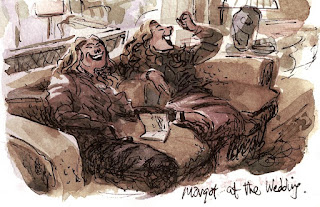 Margot at the Wedding was actually one of the last films I saw at the festival; it was smart, funny, articulate, subtle, obscure and very full of Noah Bombachisms. More cynical and darkly toned than his previous film, the Squid and the Whale, Noah populates this world with passive aggressive, hypocritical, selfish characters--but mostly it's Margot. It presents problems without solutions, and perhaps leaves the audience without the emotional release it wants, but it's curiously structured, terrifically written, and a pleasure to watch. One of the best of the fest. Margot at the Wedding
Margot at the Wedding was actually one of the last films I saw at the festival; it was smart, funny, articulate, subtle, obscure and very full of Noah Bombachisms. More cynical and darkly toned than his previous film, the Squid and the Whale, Noah populates this world with passive aggressive, hypocritical, selfish characters--but mostly it's Margot. It presents problems without solutions, and perhaps leaves the audience without the emotional release it wants, but it's curiously structured, terrifically written, and a pleasure to watch. One of the best of the fest. Margot at the Wedding Persepolis was the first film I saw, and certainly one of the very very best. Clever, creative, dignified, broad, mature, adult, funny, very entertaining... and hopefully groundbreaking. This is finally an animated film that deals with the drama and violence of the real world without compromise. It takes great advantage of the medium, and though perhaps it could linger a little longer and trust in its character animation, allowing itself to be more emotionally involving rather than merely illustrative, it's terrifically successful, and extremely accessible. I hope this proves to be a very important film, and gets watched by everyone. Perhaps one of my favourite animated films ever. Persepolis
Persepolis was the first film I saw, and certainly one of the very very best. Clever, creative, dignified, broad, mature, adult, funny, very entertaining... and hopefully groundbreaking. This is finally an animated film that deals with the drama and violence of the real world without compromise. It takes great advantage of the medium, and though perhaps it could linger a little longer and trust in its character animation, allowing itself to be more emotionally involving rather than merely illustrative, it's terrifically successful, and extremely accessible. I hope this proves to be a very important film, and gets watched by everyone. Perhaps one of my favourite animated films ever. Persepolis Well this is just too many great films for one post. Erik Nitzche: the early years, written by the great Danish director Lars Von Trier under his nom de plume, was the most fun film of the festival. It was sharp. funny, and visually rich, but a little muddley story-wise. What was it about beyond what it was about? The story of a corrupted innocent, this autobiographical work carries us emotionally with Erik as he is threatened, judged, panned and discouraged, and yet perseveres. But how is he different from any of the other characters? Are they dishonest in their intentions? Too full of themselves? Is Erik really a better filmmaker? Or is the idea that everyone deserves the chance to try to hold on to the thing they love? My painting looks serious, but if you love Lars, then you'll find this film pretty insightful, and pretty damn entertaining. Erik Nitzche: the early years
Well this is just too many great films for one post. Erik Nitzche: the early years, written by the great Danish director Lars Von Trier under his nom de plume, was the most fun film of the festival. It was sharp. funny, and visually rich, but a little muddley story-wise. What was it about beyond what it was about? The story of a corrupted innocent, this autobiographical work carries us emotionally with Erik as he is threatened, judged, panned and discouraged, and yet perseveres. But how is he different from any of the other characters? Are they dishonest in their intentions? Too full of themselves? Is Erik really a better filmmaker? Or is the idea that everyone deserves the chance to try to hold on to the thing they love? My painting looks serious, but if you love Lars, then you'll find this film pretty insightful, and pretty damn entertaining. Erik Nitzche: the early years Secret Sunshine involves a Korean woman who, after suffering two great tragedies, turns to religion, only to find heavy disappointment. Though it's pretty long and occaisionally tends toward melodrama, there are some very powerful scenes, and strong ideas. There's a great character named Mr. Lee, who is funny, sympathetic, sad, understandably frustrated, and beautifuly loyal. It's not as emotionally involving as I would have hoped, but it did manage a few things very well. Secret Sunshine
Secret Sunshine involves a Korean woman who, after suffering two great tragedies, turns to religion, only to find heavy disappointment. Though it's pretty long and occaisionally tends toward melodrama, there are some very powerful scenes, and strong ideas. There's a great character named Mr. Lee, who is funny, sympathetic, sad, understandably frustrated, and beautifuly loyal. It's not as emotionally involving as I would have hoped, but it did manage a few things very well. Secret Sunshine
September 20, 2007
The Toronto International Film Festival 2007

Two bouts of lost luggage and hundreds of kilometers later (that's Canadian miles for you Yanks), and I'm back from visiting family and friends and attending the Toronto International Film Festival; always an awesome awesome time. I've kept a bit of a record that I'm trying to finish up; I hope to post some movie reviews for you. Stay tuned!



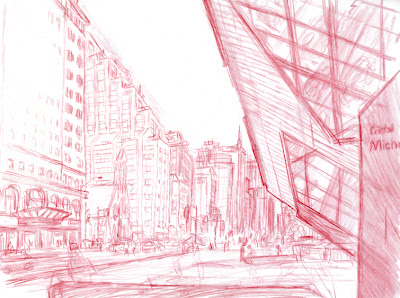
August 16, 2007
One Year

























